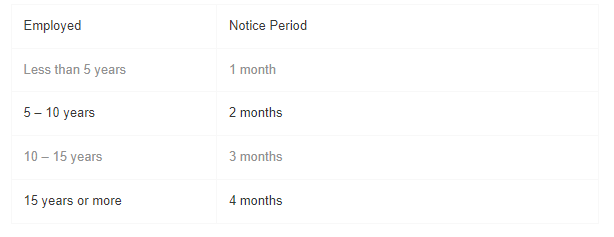
Job loss is a fact of professional life – but you don’t have to be surprised by what comes next. While the uncertainty of losing a job can be stressful, both Dutch and non-Dutch people employed in the Netherlands can expect to be fairly well protected.
The Netherlands is known for being a country with strong employee protection. For one, the Netherlands does not believe in “at-will firing” so there’s seldom a chance that you will ever be surprised by your job loss. In fact, employers need to give you at least one month’s notice before you’re out of a job – giving you time to set yourself up for success.
With one month before your unemployment, what options do you have after losing your job?
How notice works in the Netherlands
Most legal employment contracts in the Netherlands will detail the notice procedure for both employer and employee. Although your notice procedure may differ based on company policy or CAO requirements, the legally-mandated minimum to provide notice is one month. In other words, if your employer intends to dismiss you, they will need to let you know at least one month before the end of your contract. You must provide the same amount of notice if you intend to leave your job.
If you have a contract without an end date (permanent contract), you may be entitled to an even longer notice period. The duration of notice will differ if you work in an industry governed by a CAO. Otherwise, the notice period for permanent contracts scales as follows:

Employers can only dismiss employees without notice during their probation period or in the event of gross misconduct.
Dismissal impact on residency in the Netherlands
If you needed a visa to work in the Netherlands, being dismissed from your position may also impact your residency status. Depending on the type of work or residency visa you hold, the amount of time you have to live in the Netherlands, find a new job, and your access to unemployment benefits will vary. In the Netherlands, authorities typically issue work visas for durations of either 3 months, 1 year, or 5 years.
Your ID card usually indicates this duration as an expiration date (expiratiedatum). This date no longer applies the moment your “reason for stay” (Bijzonderheden) in the Netherlands changes. If your “reason for stay” in the Netherlands is work, then the date written on your ID card no longer applies.
It’s best to research your specific case, but we’ve included a quick overview of what you can expect if you hold any of these standard work visas –
Highly skilled migrant (Kennismigrant):
Highly skilled migrants have 3 months from the end of their contract to start a new job before their residency will be revoked. You would not receive these additional 3 months if your residence was set to expire sooner. Your 30% ruling benefits can transfer to a new employer as long as you start working within 3 months.
Orientation year (zoekjaar):
The purpose of the Orientation Year is to give new graduates the freedom to live in the Netherlands while they search for a job. Therefore, dismissal while on the orientation year will not impact your residency – your residence will end on the “expiration date” stated on your residence card. To extend your residence in the Netherlands, you will need to find employment by a company willing to give you a recognized sponsor Highly skilled migrant visa during this orientation year period. Unfortunately, it is not possible to extend or apply for another orientation year in the event of a dismissal.
Single -permit (GVVA)(most common case: Intracorporate transferee) :
Employees who come to work in the Netherlands on a single permit during a long-term assignment (more than 1 year) will have 3 months from the end of their contract to find a new job. This 3 month period does extend your residence beyond the listed expiration date.
If you have come to live in the Netherlands because of your family member’s employment, the impact of dismissal will be the same as your family member. For example, if your spouse is dismissed while holding a highly skilled migrant visa, you and your spouse will have maximum 3 months to reside in the Netherlands unless your spouse finds a new position.
Compensation you are entitled to after dismissal (transition allowance)
Most workers in the Netherlands are entitled to severance payment by the end of the contract. This allowance is intended to ease the transition from one job to another. The amount of compensation you are owed is based on a multitude of factors:
- Reason for dismissal
- Amount of time you spent employed by this company
- Measures your employer is taking to help you find a new job
Reason for dismissal
More often than not – if you’re forced to leave your role, you will be entitled to some form of compensation. The standard and most acceptable reasons to expect a transition allowance is in the event your temporary contract is not extended beyond its end date or you’re dismissed for any reason besides bankruptcy.
In most cases, you are not entitled to a transition allowance if you choose to leave the company, or if your contract is ended through mutual consent. If your dismissal is the result of your employer declaring bankruptcy, you will also unlikely be able to claim transition payment.
Amount of time you spent employed
Transition payment is calculated from the first day of your employment until your expected “last day” of employment. As a result, the amount of transition payment you can expect will increase the longer you’ve worked for your employer. To get an idea of how much transition allowance you are owed, you can use this tool to calculate what you are owed.
Measures taken to help you find a new job
Because this allowance is meant to ease your transition in finding a new role, you can decide alongside your employer to put forth a portion (or all) of your transition allowance towards schooling or outplacement services. Costs towards these types of services are deductible for the employer – which means you could potentially get more value out of ‘job placement’ services rather than accepting cash directly.
As a rule, your employer must provide severance payment whenever they dismiss you. This is similar to the case when the employee and the employer mutually agree to end the employment relationship with a settlement agreement.
Types of severance available
Depending on the grounds of dismissal, you can expect three different types of financial compensation.
- Transition payment: worth up to the amount of one-third of your gross monthly salary per year from the first day of employment. Use this tool to calculate what you’re owed.
- Additional payment based on cumulation ground: In the event your dismissal goes to court, you may be granted additional payment based on the grounds on which you were dismissed.
- Fair compensation in case of seriously culpable behavior: This compensation may be awarded by the court if the serious misconduct is committed by your employer.
Can I get unemployment benefits?
If you are employed to work in the Netherlands, you are most likely insured for unemployment (WW-uitkering) in the Netherlands. As long as you are insured for unemployment, you are able to receive benefits when you meet the criteria outlined by the department for employee insurance (UWV).
- You did not voluntarily leave your position
- You have been employed for at least 26 out of 36 weeks before your first day of unemployment
- You are under 65 years of age and above the age of 26
- You are immediately available for paid work
- You are not receiving any sickness or disability benefits that preclude you from working
You’re able to apply for unemployment benefits as early as one week before you become unemployed, but you only have one week from your last working day to apply for the benefit. It is possible to apply late, but then you may not receive full benefits. Try out this tool available online that will help you calculate the amount you can expect to receive (in Dutch).
How to find a new job in the Netherlands
Finding a new job in the Netherlands in 2021 is not as difficult as it may have been in the past. The pandemic last year forced plenty of businesses to “panic downsize” to the point where there are currently more job vacancies open than unemployed people.
Most open vacancies in the Netherlands are owned by recruitment and staffing companies – so it makes sense to send your CV to these companies. Before you have a network in the Netherlands, online job boards and social media are a great way to find new jobs. Here’s an infographic with tips we put together to help you search for a job on social media, and some tips about how to explain an employment gap in your CV to potential employers.
If you want to improve your chances at finding a new job in the Netherlands quickly – consider negotiating with your employer for job search services. Job search services are designed to help you identify relevant job opportunities in the market and apply for them effectively. Outplacement services traditionally include CV and cover letter writing workshops, and some form of job search support.
The best part about these job search services is that your employer will be able to cover the majority (if not all) of the costs for these services with your severance package. It’s become a trend in the Netherlands for employers to offer these types of benefits during dismissals – but you can always do your own research and discuss incorporating such services in your compensation package.
more news

Orientation year 2024: guide for international graduates in the Netherlands
14-06-24
An Orientation Year (or zoekjaar, in Dutch) is what allows international students to live and search for a job in the Netherlands for up to 12 months.

Navigating recruitment in the age of AI
30-05-24
AI is changing how companies find and hire people. AI tools make recruiting faster and more efficient, taking over tasks that used to take a lot of time and effort. But using AI in hiring also comes with challenges. In this post, we’ll look at the pros and cons of using AI in recruitment.